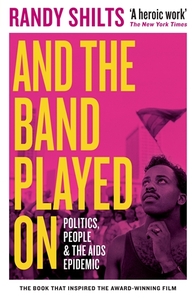Take a photo of a barcode or cover
informative
reflective
medium-paced
Magistral. Ça m’aura pris un an et demi, mais je suis si content de m’être donné le défi de le terminer avant la fin de 2022 (il est 23h et des poussières).
I'm sad that we as a country haven't learned better from the experiences in this book.
emotional
informative
reflective
sad
tense
slow-paced
challenging
informative
reflective
sad
slow-paced
This is a book about AIDS and how the virus came to be realized in the late 1970's in a small African country, and then spread unchecked by the gay community in North America. The author recounts how early medical opinions differed on the various causes, and included being a case of bad drugs, or that the disease was transmitted by sperm. Not semen, but sperm. This book is really about the gay community coming to the realization that they are in real trouble with a virus that seems to be coming after them, the doctors that tried to science their way to the right answers, and the politicians that stood in the way.
The author, Randy Shilts, really outdid himself in terms of researching and checking his material for this book. I mean, he was able to recreate early political manuveurings and meetings for dozens of characters and get them all put in a semblance of chronological order. This book is really a must-read for anyone interested in epidemiology or AIDS or both. I found this book incredibly fascinating even though I ultimately could not finish it. The chapters are mercifully short and broken down into smaller pieces about who was doing what and when. There's a nice mix of medical, politics and science all stirred in together in each chapter usually. It's not written in a super-complicated fashion but it is very densely packed information, if that makes sense. It took me about ten days to read about 178 pages. In the end, I had to put this book down because it was just taking up too much time to read and was really kind of an information overload. It is a good book though. I may try reading it in its entirety at another time.
The author, Randy Shilts, really outdid himself in terms of researching and checking his material for this book. I mean, he was able to recreate early political manuveurings and meetings for dozens of characters and get them all put in a semblance of chronological order. This book is really a must-read for anyone interested in epidemiology or AIDS or both. I found this book incredibly fascinating even though I ultimately could not finish it. The chapters are mercifully short and broken down into smaller pieces about who was doing what and when. There's a nice mix of medical, politics and science all stirred in together in each chapter usually. It's not written in a super-complicated fashion but it is very densely packed information, if that makes sense. It took me about ten days to read about 178 pages. In the end, I had to put this book down because it was just taking up too much time to read and was really kind of an information overload. It is a good book though. I may try reading it in its entirety at another time.
challenging
dark
emotional
informative
inspiring
reflective
slow-paced
An incredible work, detailing some of humanity's biggest failures and the hard work of some of the AIDS crisis' biggest heroes.
Be prepared for tears and to reflect as you read about so many important journeys and so many bright lights flickering out before they should have.
Be prepared for tears and to reflect as you read about so many important journeys and so many bright lights flickering out before they should have.
a stunningly well-reported and well-written book that unfortunately falls into some simplistic pitfalls in the way it depicts the alleged “patient zero” of the AIDS epidemic. made me extremely emotional and also made me want to seek more books about ACT UP—this book ends before its foundation
I’m planning to come back to this at some point; I just lost motivation to finish. It’s a lot of information, and because it’s history and I know the general shape of the story, there’s a kind of dread rising through the entire experience of reading. I wish there was an audiobook so I could just power through!
Graphic: Death, Pandemic/Epidemic
Moderate: Sexual content
Heartbreaking, fascinating, and frustrating in equal measures. I found this book after watching the TV show Pose.
We often think of epidemics as things that happen in the 3rd World or in fiction, but there was an epidemic in modern times and this is the book to read if you want to know more about it. Shilts did so much research and investigation for this book but it also reads quite informally and it's not the dense tome you might imagine. I found out that Shilts was tested for HIV while writing this book and he refused to be told the result until he completed it for fear of being labelled as biased...this added an extra dimension to my reading. I wondered why my edition hadn't had any 21st century updates added, but then I found out that it was because Randy Shilts died in 1994.
The book traces the virus from the first time it surfaced in the western world, to the gay clubs and bath houses of San Francisco, and from there we delve into the stories of the people who found out they had it, the people who pushed for more government spending, and the scientists who researched this strange new illness. I had no idea that there was so much fault - I knew the government pretended it didn't exist, but to read about the scientists bickering over who discovered it first and who should take credit, and the greedy managers of the bath houses who refused to be open with their customers about the spread of the disease, was shocking and frustrating. "The Lost Generation" is usually a name given to the men who died in WWI, but there is a generation of gay men who had no chance against this disease who also get that title.
Shilts is very straight up with his language and descriptions, but it never feels vulgar because being straightforward was something severely lacking during the AIDS epidemic. When "AIDspeak" surfaces we get to see how no one official wanted to say "bodily fluids" or "anal intercourse" because of offending sensibilities, and how much of the fault lay with the people who didn't want to upset or offend anyone by telling them what sexual acts to avoid to save their lives.
An excellent book with so much detail and heart.
We often think of epidemics as things that happen in the 3rd World or in fiction, but there was an epidemic in modern times and this is the book to read if you want to know more about it. Shilts did so much research and investigation for this book but it also reads quite informally and it's not the dense tome you might imagine. I found out that Shilts was tested for HIV while writing this book and he refused to be told the result until he completed it for fear of being labelled as biased...this added an extra dimension to my reading. I wondered why my edition hadn't had any 21st century updates added, but then I found out that it was because Randy Shilts died in 1994.
The book traces the virus from the first time it surfaced in the western world, to the gay clubs and bath houses of San Francisco, and from there we delve into the stories of the people who found out they had it, the people who pushed for more government spending, and the scientists who researched this strange new illness. I had no idea that there was so much fault - I knew the government pretended it didn't exist, but to read about the scientists bickering over who discovered it first and who should take credit, and the greedy managers of the bath houses who refused to be open with their customers about the spread of the disease, was shocking and frustrating. "The Lost Generation" is usually a name given to the men who died in WWI, but there is a generation of gay men who had no chance against this disease who also get that title.
Shilts is very straight up with his language and descriptions, but it never feels vulgar because being straightforward was something severely lacking during the AIDS epidemic. When "AIDspeak" surfaces we get to see how no one official wanted to say "bodily fluids" or "anal intercourse" because of offending sensibilities, and how much of the fault lay with the people who didn't want to upset or offend anyone by telling them what sexual acts to avoid to save their lives.
An excellent book with so much detail and heart.



